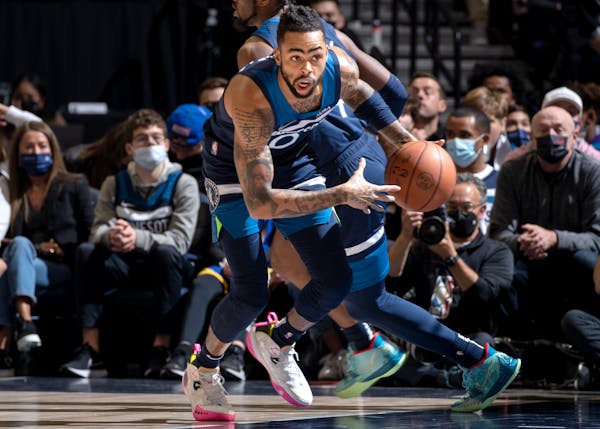SAN FRANCISCO – When Chris Finch and Anthony Edwards were watching film together recently, Edwards said the Wolves coach was pointing out something new in the second-year guard's career: Double-teams are starting to come at Edwards more often.
"Me and him, we watching film a lot more now, because it came earlier than he thought," Edwards said.
Extra attention is bound to happen more now. Edwards was in the near-unstoppable category Tuesday night in Portland, scoring 40 points in a 109-107 victory over the Trail Blazers. Everything was working for the 20-year-old, who joked he felt like "Black Jesus" when he got on the roll.
"I saw the man in front of me and I saw fear in his eyes, I guess," Edwards said. "That was all she wrote."
The next step in Edwards' progression during his second season is recognizing how teams are going to cover him differently, and with more people. One of the first times Edwards saw double-teams regularly was during a game against the Lakers earlier in January. Since then, the double-teams have been coming more frequently, and Finch and Edwards have been trying to work through what Edwards needs to do.
The first step in solving any problem is recognizing there is one, and that's where Edwards is right now when it comes to these new defensive coverages — seeing it as it's happening.
"Everything is so new for him," Finch said. "I know he hasn't seen a lot of these looks before … and he's trying to figure it out, and he's only 20. Just talking to him while I was watching some tape, I said, 'Do you see this?' And he's like, 'No, I don't really see it.' We assume he does, but we got to help him in those situations."
Then when Edwards does recognize what's happening, the next step is getting him to act decisively and quickly and to play with more purpose.
"It's hard because you only got that lane for 0.2, 0.3 seconds, especially if you're me, because they're ready to load up," Edwards said.
Finch said not every double-team or blitzing coverage is created equal.
"Some of it are doubles, and some of it is more of a crowd," Finch said. "Some of it is [teams] sending extra bodies at him once he puts the ball on the floor. They're all a little different, which is the nuance he still has to work through. He's doing a good job of adjusting as things go."
Finch said there are times when Edwards may react too much to a certain coverage, like when a team employs a drop coverage and has its big man retreat to the rim on a screen, and the coaching staff has been helping him navigate through his options when that happens.
"Things he sees sometimes, he feels like they're more of a presence than they are," Finch said. "If the big is in a drop coverage, he maybe doesn't see a pathway to the rim. We say, no, there's a pathway, this is how you have to do it, this is what's going to crack open for you. It's just all that nuanced part of the game."
In a victory Sunday against Brooklyn, Edwards went up against James Harden, who played in Houston when Finch was an assistant there. Finch got to see up close how Harden processed the game and how that ability matured with time. He has used Harden as an example for Edwards to look to when it comes to diagnosing defenses.
"Understand that you can't fight the game," Finch said. "You're not going to be able take them on [double-teams]. Having watched James go through that learning curve, there's a lot of things I can help Ant anticipate, not just in solving the problems but understanding … these are the consequences when you don't solve the problems.
"Someone's sending you a certain direction, you got to go. You got to trust your talent, you got to make the play when you get there."
No matter how many bodies you have to go through to get there.
If Edwards keeps taking steps and can master these coverages, perhaps he can reach the goal he set for himself next season.
"I was a runner-up rookie of the year, so that's cool," he said after Tuesday's victory. "But I'm going for MVP next year, for sure."





![Naz Reid (11) of the Minnesota Timberwolves Wednesday, March 27, 2024, at Target Center in Minneapolis, Minn. ] CARLOS GONZALEZ • carlos.gonzalez@](https://arc.stimg.co/startribunemedia/TGYNEKQCYNH5VEPCXSJODRMDDM.jpg?w=75&h=75&fit=crop&crop=faces)

